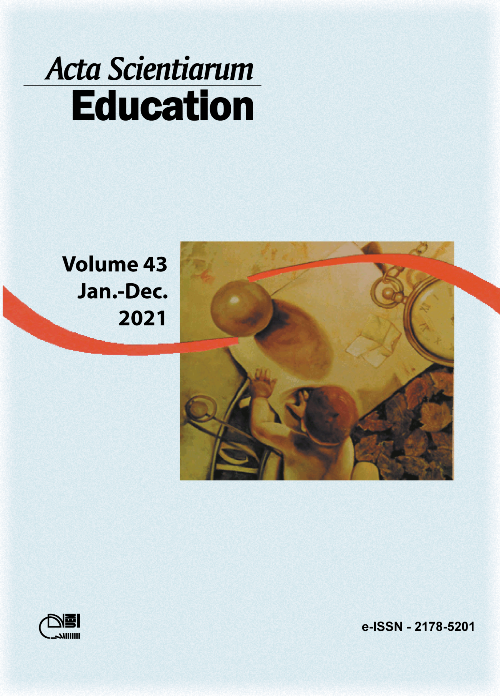Pedagogical theories and the process of internalization of moral values
Abstract
The present article proposes to reflect on the process of internalization of moral values as the primary objective of Education, through historical and philosophical sources, analyzing, for this, theoretical frameworks of Pedagogy, such as: Comenius, Pestalozzi, Herbart and Durkheim. Our methodology was based on the bibliographic and authorial writings of these theorists and we try to question the logic established in pedagogical discourses, starting from the critic of moral values formulated by Friedrich Nietzsche, emphasizing aspects present in the referred theories and their reverberations in singularities and collectivities. The process of internalizing moral values had as its priority making education an instrument for the ordering of subjects, making it useful to the interests of state culture. It is understood that subjectivities are constituted inside and outside for the moral field and that the same is not alien or should be non-existent in school. However, it has been attempted to demonstrate in this article, how the moral field has been reduced to a process of disciplining and ordering, according to pre-determined models, virtues and values, which shows the limited pedagogical perspective in the vision of the moral field, which from its conception responds to interests and prioritizes the maintenance of the status quo.
Downloads
References
Comenius, I. A. (2001). Didactic magna. Lisbon, PT: Fundação Caloutre Gulbenkian. Retrieved from https://bitlybr.com/yseYK22
Durkheim, E. (1998). Educacion y pedagogia: ensayos y controversias. Buenos Aires, AR: Losada.
Goergen, P. (2001). Moral education: training or communicative reflection? Educação & Sociedade, 22(76), 147-174. doi: 10.1590/S0101-73302001000300009
Herbart, J. F. (2003). Pedagogia geral. Lisbon, PT: Fundação Caloutre Gulbenkian.
Mosé, V. (2018). Nietzsche hoje: sobre os desafios da vida contemporânea. Petrópolis, RJ: Vozes Nobilis.
Nicolay, D. A. (2011). A noção de infância na Didática Magna de Comenius. Educação Unisinos, 15(1), 3-12. doi: 10.4013/edu.2011.151.01
Nietzsche, F. (1998). Genealogia da moral: uma polêmica. São Paulo, SP: Companhia das Letras.
Nietzsche, F. (2006). Crepúsculo dos ídolos (ou como filosofar com o martelo). São Paulo, SP: Companhia das Letras.
Paschoal, A. E. (2008). As formas do ressentimento na filosofia de Nietzsche. Philósophos – Revista de Filosofia, 13(1), 11-33. doi: 10.5216/phi.v13i1.7961
Pestalozzi, J. H. (2006). Cartas sobre educación infantil (3 ed.). Madrid, ES: Tecnos.
Ponce, W. J. (2009). A educação em valores no currículo escolar. Revista E-Curriculum, 5(1), 1-16.
Santos, M. E., & Alves, E. M. (2018). The role of the teacher in the educational theories of Pestalozzi and Herbart: some perceptions. Journal of Times and Spaces in Education, 11(1), 269-284. doi: 10. 20952/revtee.v11i01.9668

This work is licensed under a Creative Commons Attribution 4.0 International License.
DECLARATION OF ORIGINALITY AND COPYRIGHTS
I declare that this article is original and has not been submitted for publication in any other national or international journal, either in part or in its entirety.
The copyright belongs exclusively to the authors. The licensing rights used by the journal are the Creative Commons Attribution 4.0 (CC BY 4.0) license: sharing (copying and distributing the material in any medium or format) and adaptation (remixing, transforming, and building upon the material thus licensed for any purpose, including commercial purposes) are permitted.
It is recommended that you read this link for more information on the subject: providing credits and references correctly, among other crucial details for the proper use of the licensed material.















































